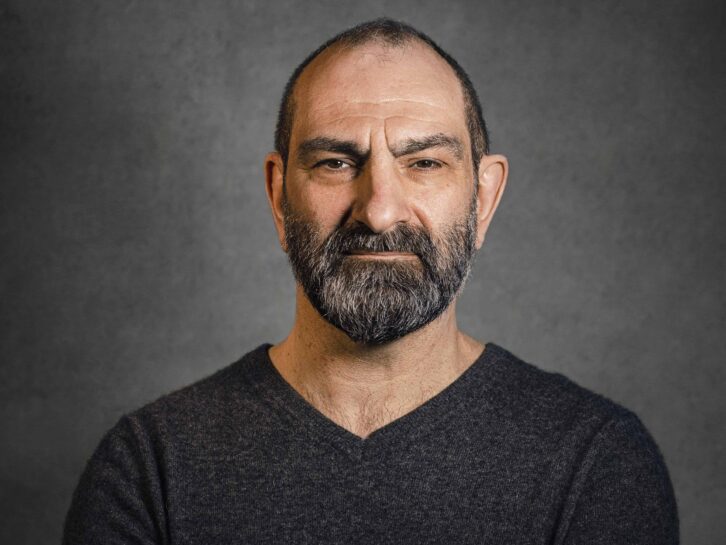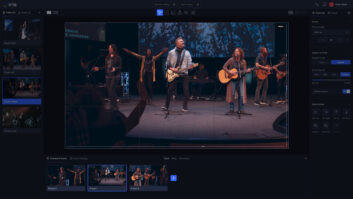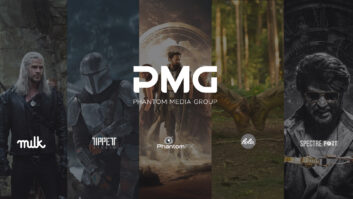Nick Franco tells TVBEurope how he went from being a master plasterer and refurbishing the ornate plasterwork at Claridge’s Hotel to founder and CEO of production and post company, 1185 Films.
Talk us through an average day in your role
Every single day is different. I could be cutting a film one day, grading it the next, budgeting the next film, writing scripts, editing, creating a new infrastructure and designing computers, building a new facility another day…I get to do everything. How many people can say that?
How did you get started in the media industry?
I left school with no qualifications. I wanted a camera but my father gave me a hawk and trowel and I became a master plasterer. At 15, I priced my first job at £40,000. I became a quantitative surveyor and by the age of 23 I had 16 people working for me and did the platforms on London’s Baker Street Underground station platforms 1,2,3 and 4 (they are still there). At the age of 26, I had 50 people working for me. I managed the refurbishment of the ornate plasterwork at Claridge’s Hotel. I’ve been fortunate that I have always managed to get prestigious contracts.

During my time in construction, I did a theoretical film course at Cambridge and a History of Art course in my spare time. My love of art came first (influenced by my brother, who graduated from Glasgow School of Arts), and then a love of film. During that period around 1996 I was ‘subby bashed’ meaning I lost (was ripped off for) £500,000, through non-payment via building companies and some of them went bankrupt.
At that point my friends – who were actors – asked me to be financial director of their production company, The Guild of Thieves Ltd, which was something I’ve always wanted to do. They had a feature script that wasn’t very good so I worked on a short film script in one night and Panavision gave me £100,000’s worth of film equipment to make my first film and it got into the Taormina Film Festival in Italy, called Split. I’ve never looked back. On setting up my own company, at first I couldn’t think of a name for it but I shot the film in aspect ratio of 1.85 :1 – hence the name of my company was born, 1185 Films. This was in 2003. I learned on the job. A bag of cement became a film camera. When you produce, it’s all about numbers and vision and running a business had taught me a great deal.
What training did you have before entering the industry?
I’ve always been very technical. Because I was so young in construction, people would often try and blame me for stuff. There’s a lot of bullies in construction therefore I had to know the science. To this day, I’m all about the science behind everything and knowing why things work, for example, why pixels appear on the screen, how camera chips work. All that kind of thing I picked up on. Having come out of school with no qualifications my biggest coup was filming Stephen Hawking in 2014 about the origin of the universe. I’m still immensely proud of that moment, thanks to Philip Halper who allowed me the opportunity.
I had no training. I was self-taught but that doesn’t mean you’re not trained. My peers in the industry taught me, so you learn from them. You can learn things parrot fashion or you can do things and learn them for real. I learned from doing, and that’s probably the best way of learning. It contextualises stuff very well. You learn from those mistakes, and those mistakes can be harsh. I wish I’d had the opportunity to go to university to do this, but there are plenty of people who go to university who have no idea how to make a film. They might have it all in theory, but the practicality of making a film just doesn’t work. Having said that, I would always recommend someone goes to university. My life hasn’t been like that and I think I would have been a lot further in my career if I had gone to university but I’ve had two or three different careers and I don’t regret one moment. Education has a place but education it isn’t the answer to everything. I’ve had a lot of people come through from the National Film & TV School. Some of them are amazing but it’s not the be-all and end-all. At the end of the day, it comes down to the individual and how they can adapt to what they’ve been taught into something of use. Just because I haven’t been through that process doesn’t mean I dismiss it. I do believe there should be more apprenticeships in conjunction with university and education, across the industry.
Why do you enjoy working in the industry?
I am the luckiest person on the planet but I have to work very hard at it. I’ll pick up a broom and sweep the floor. I’ll clean the toilet. I won’t ask anyone to do anything I won’t do. I loved my career in building because I built something and you could see it. My work exists, beyond me. Film is another way of building and I enjoy building, creating.
I’ve met and worked with some amazing people. Some are like brothers – writer/ director Paul Duane, Eugene O’Connor (DoP of Father Ted, director of Killinaskully) and Chris Cowey (Top of the Pops), Ray Burdis. Some are also legends like Stephen Hawking, Bob Geldof and Zak Starkey. They all have their moments, they are all human – good people are good people.
What piece of advice would you offer someone looking to explore a role similar to yours?
Never give up. You have to be tenacious and keep going. There are days when you wonder ‘how am I going to solve this?’ and you question yourself continuously but you have to keep going. I think unrelenting optimism helps! Also, education, education, education. There’s not one day when I don’t learn something new. You never stop learning and that’s also the thing I love about this work.
I tend to see myself as a blend of science, music and art. That’s what I like to mix up. I think if you have those three elements you can kind of do anything.







